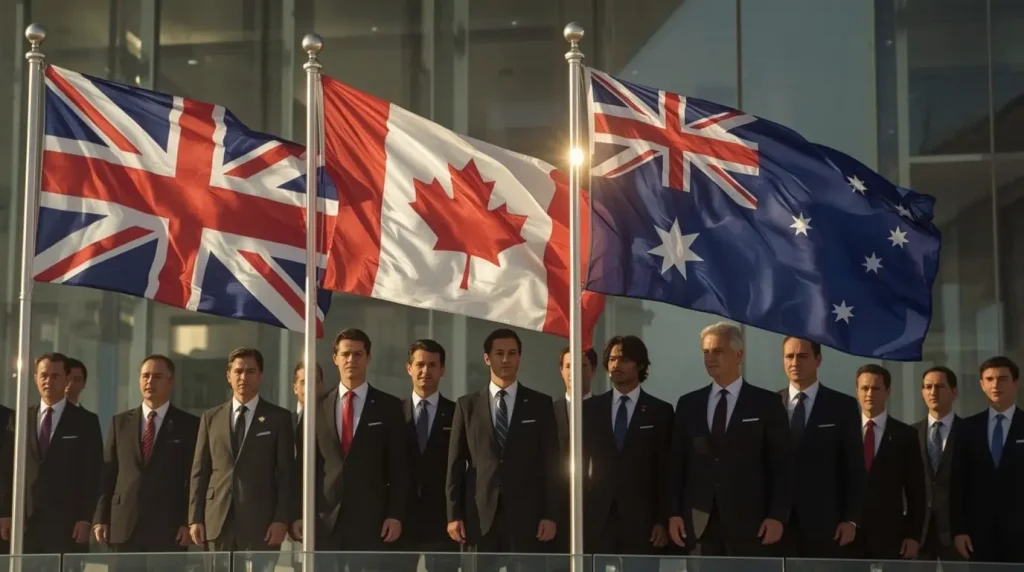In a big change for global diplomacy, the UK, Canada, and Australia officially recognized Palestinian State on September 21, 2025. More than 150 nations now stand behind the Palestinian bid, giving fresh momentum to the long-delayed two-state solution. The countries timed the announcement just before the United Nations General Assembly meeting to signal mounting frustration with the stalled peace talks and the worsening humanitarian crisis in Gaza.
The Announcements and Immediate Reactions
UK’s Strategic Decision
Prime Minister Keir Starmer of the UK stressed that the recognition of Palestinian State is an effort to “keep alive the possibility of peace” rather than a nod to Hamas. In a video address he said, “The light of the two-state solution is flickering, but we refuse to let it go dark… To restore the faint flicker of hope, the UK today officially recognizes the Palestinian state.” The UK’s recognition follows the 1967 borders, names East Jerusalem as the Palestinian capital, and opens the door for full diplomatic relations, including a possible upgrade of the Palestinian diplomatic mission to full ambassadorial status.
Canada and Australia Follow Suit
On the same day that the U.K. announced its recognition, Canadian Prime Minister Mark Carney and Australian Prime Minister Anthony Albanese issued mirrored statements. Carney emphasized the importance of the Palestinian State, stating that formal recognition “empowers those who seek peaceful coexistence and the end of Hamas.” Albanese, meanwhile, added that the next milestones—such as the opening of Australian and Canadian embassies—would proceed as the Palestinian Authority demonstrates credible reforms.

Israeli Condemnation and International Support
Israeli officials reacted swiftly. Prime Minister Benjamin Netanyahu called the recognitions “absurd” and denounced them as “a reward for terrorism.” He cautioned that such foreign moves “undermine the chances of achieving a peaceful solution.” In stark contrast, Husam Zomlot, the Palestinian head of mission in London, greeted the announcements as “an irreversible step towards justice, peace, and the correction of historic wrongs,” citing the long-established impacts of the British colonial era and the 1917 Balfour Declaration.
Historical Context of Palestinian State Recognition
Early Recognition Efforts
The drive to gain global backing for a Palestinian state has roots that reach back decades. On November 15, 1988, Yasser Arafat, leader of the Palestine Liberation Organization (PLO), declared that Palestine was an independent state, naming Jerusalem the capital. This announcement set off a chain of recognitions, mostly coming from countries in the Global South—nations across Africa, Asia, Latin America, and the Arab world. By the end of 1988, 78 states had granted the Palestinian declaration diplomatic backing, and by 2011 that support had expanded to 122 nations.
Key Milestones
In 2012, the United Nations General Assembly elevated Palestine to non-member observer state status, marking an important step toward international legitimacy. Two years later, in 2014, Sweden became the first nation in Western Europe to formally acknowledge the state. A renewed wave of recognitions arrived in 2024, when the conflict in Gaza rekindled diplomatic activity and countries such as Ireland, Norway, Spain, Slovenia, and a number of Caribbean states publicly established recognition. Looking ahead to 2025, France has committed to formally recognize Palestine before the end of that year, while Portugal has joined the UK, Canada, and Australia in statements from September 21 reiterating support for a two-state solution.
Current Statistics
As of September 2025, 151 out of 193 United Nations member states officially acknowledge Palestine as a sovereign state, which is more than 78% of the world’s governments. The list includes the majority of the Global South and a growing number of European countries.
Implications for the Two-State Solution
Diplomatic Pressure on Israel
Western countries in the Group of Seven, including the United Kingdom and Canada, recently formalised their recognition. These states normally stand as Israel’s key security partners, so their shift creates a more isolating diplomatic climate for Jerusalem. The move is intended, according to Labour leader Keir Starmer, to exert precise pressure on the Netanyahu administration to end the “illegal occupation of Palestine” and to return to serious peace talks.
Strengthening Palestinian Sovereignty
By enlarging the number of states that recognise it, the Palestinian authority secures a stronger diplomatic base. This enhancement allows Palestine to bring Israeli actions to international accountability bodies, updating its overseas legal toolbox. It also reinforces the Palestinian Authority’s title as the official and legal representative of Palestinian people and interests.
Humanitarian Considerations
The humanitarian situation in Gaza has worsened, with bodies like UNICEF reporting shortages of medicines and clean water. Starmer warned that the “man-made humanitarian crisis” is “not merely regrettable; it is utterly intolerable.” International recognition of Palestinian State is therefore also seen as a political rather than simply symbolic manoeuvre that may lead to clearer governance, improved security for aid deliveries, and proper future investments to prevent the collapse of health and education institutions.
Global Response and Future Steps
European and International Support
The UK’s announcement is part of a wider European wave. France, Belgium, and other countries will formally back Palestinian statehood at the UN General Assembly meeting in September 2025. Meanwhile, Portugal’s Foreign Minister, Paulo Rangel, said this recognition is a bedrock of Portuguese foreign policy and reiterated the need for an immediate ceasefire and the safe return of hostages.
US Position
The United States still rejects any statehood that is declared without negotiations and insists that talks are the only way to resolve the conflict. This stance is leaving the White House more and more isolated, as a growing number of Western allies announce that recognizing the Palestinian State is a condition for forging a long-lasting peace.
Path Forward
Most of these Palestinian State recognitions are symbolic, yet they have serious diplomatic implications. Deputy Prime Minister David Lammy said, “Recognition itself won’t feed children or free hostages,” but the acknowledgments breathe life into future talks aimed at a two-state resolution. Possible next steps are:
- Diplomatic Relations: Opening Palestinian State embassies in European capitals and so creating formal bilateral agreements.
- UN Membership: A fresh drive for full UN membership is likely, although the US has veto power that will make any resolution trickier.
- Peace Talks: Leaders are under growing international pressure to return to negotiations based on borders from 1967.
Conclusion: A Renewed Hope for Peace
When the UK, Canada, and Australia recently recognized the Palestinian state, the event went beyond formal diplomacy. Although the announcement won’t change daily life for most people right away, the country’s flags and embassies do matter. They demonstrate that more nations now believe that lasting peace starts with treating Palestine not as an “entity” but as an equal, independent state. Over the past months, city halls and church basements the world over have heard calls for the same, and those voices will reach New York again for the UN General Assembly.
As clocks strike morning prayer again and again, another round of what’s called “listening to the partners” will get heard, will get touched. By the end, both of those partners can emerge safe. Some talk money. Some talk land. Some talk rights. Whatever the accent, the entire conversation rests on the same hope: that a secure Israel and a length-off state called Palestine can become neighbors that prosper, that raise kids, that eat barbecues and that find fresh footfalls of shared life on both sides.
Source: https://edition.cnn.com/2025/09/21/world/palestinian-state-uk-canada-australia-intl
For more news updates, visit our home page.




